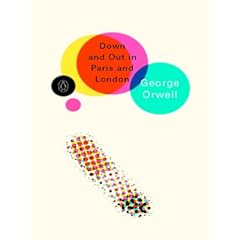
Another of the books crossed off the ambitious list of purchases from Macondo books!
Down and Out in Paris and London by George Orwell was an attempt to round out my Orwellian repertoire. Although it's still chock full of social commentary, Down and Out is reality-based (no pig dictatorships or Ministry of Love or anything quite so fanciful and quirky as that...).
In an attempt to be specific, here's a list! That's right, a list of "Things I loved most about DaOiPaL:"
OOh. Perhaps, before I start the list I should mention that I found the entire text of this book online! I don't, of course, regret buying the book. As much as I technology, I think that a book is a perfect piece of technology just the way it is. This online book, however, will make referencing my favourite parts quite simple. Here we go. On with the list...
1. Orwell's reflections on the secrecy of poverty. (Start reading at about the 4th paragraph here.)
Hiding poverty is costly-- and an interesting bit of science - ie. you buy the more expensive bread, because its shape makes it easier to smuggle in your pocket...
2. The grotesque 'truth' about manhandled foods and expensive Parisian restaurants. (Where food is just food, it's just slapped on your plate, haphazardly and shoved in front of you. Where food is art, it's pinched and poked with sweaty fingers. Chefs' thumbs are swirled in sauces, tasted, and swirled in sauces again. ...Hungry yet? Despite today's high restaurant standards, I will never look at swank menus without calculating the food's proximity to the various bodily fluids of the kitchen staff.) If you're brave enough to read this chunk, you'll want to start with the delicious paragraph, "In the kitchen the dirt was worse."
3. Orwell's commentary on the creation of swear words in any dialect. (Confession: I have a small fascination with how exactly a word becomes a 'swear' and why we're so insistent on creating and using these words...) Why can a swear world become so vile in one language and be a completely acceptable word in another? ((My)Short answer: it gives us something to muse and giggle about. Orwell's answer is a little more intellectual. Short of spoiling it, I'll let you read it for yourself. Start at "The whole business of swearing..." and enjoy...
4. A quote that sums up a common theme from the last 3rd of the book: "It is curious how people take it for granted that they have a right to preach at you and pray over you as soon as your income falls below a certain level." (Read it here.)
Orwell's DaOiPaL gives a perspective that is both historical and timeless. Get a glimpse into the backstreets of Paris and London and an eyeful and mindful of the problem of poverty. Although the conditions may be slightly different today, the overarching truths are disturbingly unchanged.
No comments:
Post a Comment